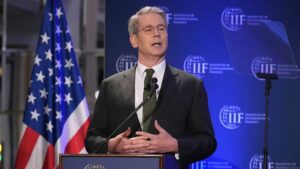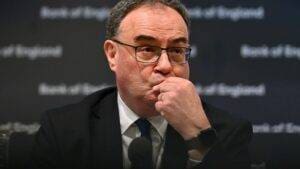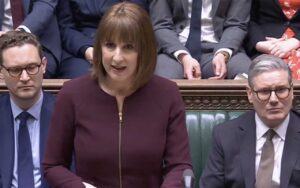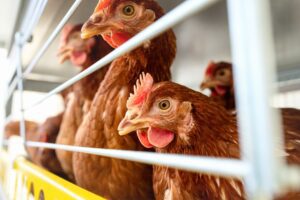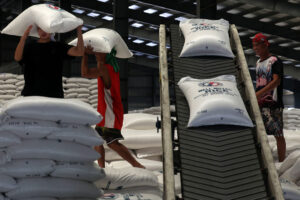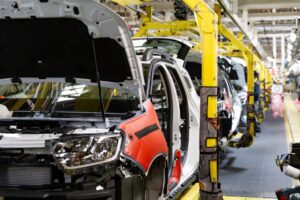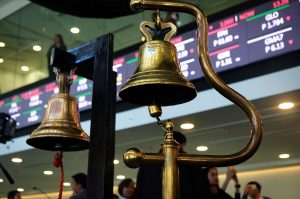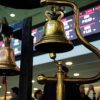A sweeping new round of tariffs from President Trump has sent shockwaves through global markets, wiping billions of euros off the value of major European carmakers and dealing a fresh blow to the UK’s automotive sector.
Trump’s decision to impose a 25 per cent tariff on all imports of cars and parts into the US — set to take effect on 2 April — triggered sharp selloffs in global equities, with automakers bearing the brunt.
Shares in German giants Mercedes-Benz, BMW, Porsche and Volkswagen fell between 2 per cent and 5 per cent, while Stellantis — parent company of Vauxhall, Fiat, Citroen and Peugeot — dropped 6 per cent in Paris. In London, luxury carmaker Aston Martin fell 4.47 per cent, dragging the FTSE 100 index down 0.6 per cent to 8,638.04. Germany’s DAX lost 1.42 per cent and France’s CAC 40 slipped 1 per cent.
The fallout wasn’t limited to Europe. In after-hours US trading, General Motors fell 8 per cent and Ford 3.7 per cent. Asian markets followed suit, with Toyota, Nissan, Mazda, Hyundai and Kia all dropping, while Tata Motors — parent of Jaguar Land Rover — fell 5 per cent on India’s stock exchange.
The new tariffs threaten a vital lifeline for the UK automotive industry. The US is the UK’s second-largest car export market, accounting for nearly 17 per cent of total exports, or around 79,000 vehicles in 2024, according to the Society of Motor Manufacturers and Traders (SMMT). Exports to the US had surged by 38.5 per cent last year, even as exports to the EU and China declined sharply.
Nissan, which operates the UK’s largest car plant in Sunderland, exported more than 73,000 vehicles to the US last year — a full 10 per cent of its total UK output. Meanwhile, luxury marques like Rolls-Royce, Aston Martin and McLaren are heavily reliant on US sales.
The SMMT warned that nearly eight in ten cars made in Britain are exported, with any disruption to international trade posing a serious threat to the industry’s recovery.
Even before the tariffs were announced, British car production was struggling. Output fell 11.6 per cent in February, marking the twelfth consecutive month of declines, according to SMMT data released overnight.
President Trump defended the tariffs, claiming the US was “the piggy bank that everybody steals from.” He views tariffs as a tool to raise revenue to pay for tax cuts and revive domestic industry — even as economists warn of higher prices, supply chain disruption, and retaliatory trade action.
Trump has threatened even harsher tariffs if trading partners respond in kind. “If the EU and Canada team up to retaliate, we’ll go further,” he warned.
In response, Canadian Prime Minister Mark Carney condemned the tariffs as a “direct attack” and pledged to defend national interests, while Japan and South Korea signalled emergency responses were being prepared. European Commission President Ursula von der Leyen said the EU would continue to pursue “negotiated solutions while safeguarding its economic interests.”
In the UK, Chancellor Rachel Reeves told Times Radio that talks were under way to secure a trade agreement with the US to avoid the tariffs. However, economists warned that even if the UK is spared direct inclusion, the knock-on effects could be damaging.
David Miles, economist at the Office for Budget Responsibility, said: “There is a growing realisation that we could be in for a major blow to trade that wasn’t there a few weeks ago.”
The OBR now forecasts that if global trade tensions escalate into a full-blown tariff war — with average import duties rising by 20 percentage points between the US and its partners — UK GDP could shrink by up to 1 per cent at its peak.
With tariffs set to take effect from 3 April and further retaliatory measures on the horizon, the risk of a full-scale trade war is growing. For UK and European carmakers already under pressure, Trump’s latest move could not have come at a worse time.
